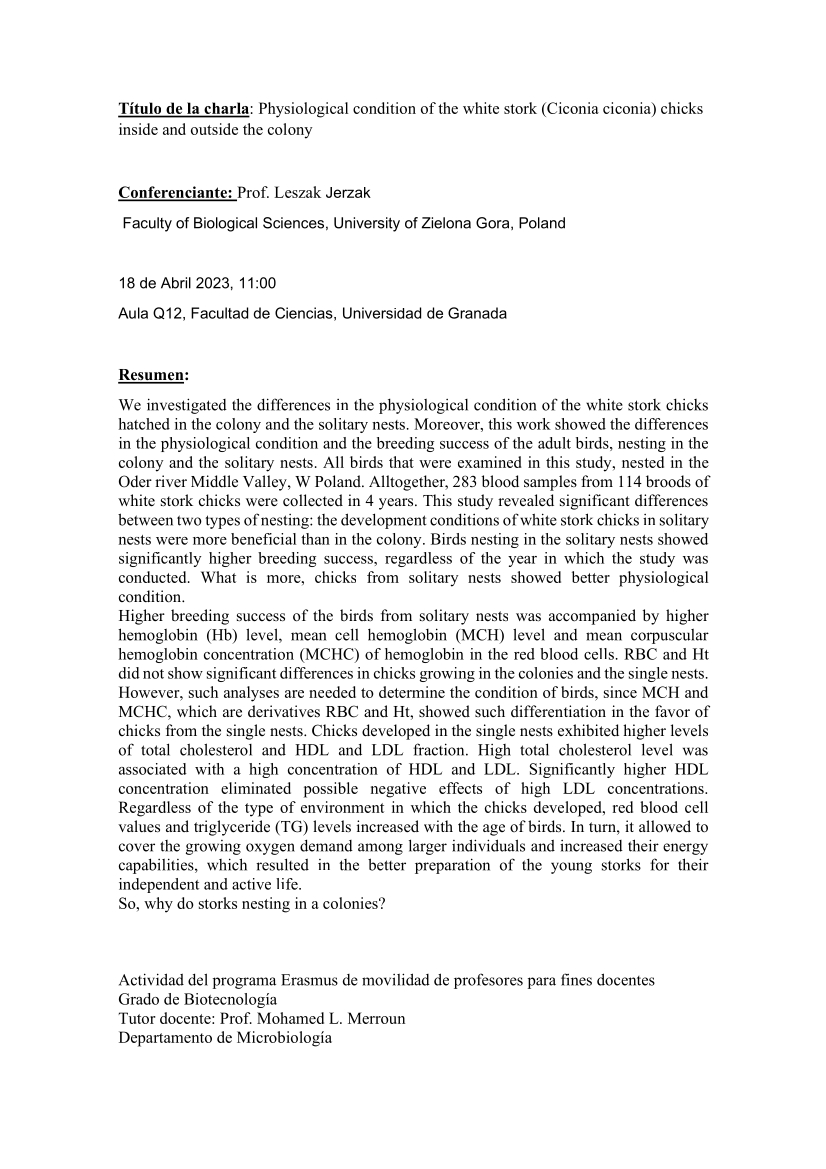Fecha: 20 de Abril 2023.
Hora: 11:00 h.
Lugar: Aula Q12, Facultad de Ciencias, Universidad de Granada.
Conferenciante: Prof. Leszak Jerzak. Faculty of Biological Sciences, University of Zielona Gora, Poland.
Actividad del programa Erasmus de movilidad de profesores para fines docentes. Grado de Biotecnología
We investigated the differences in the physiological condition of the white stork chicks hatched in the colony and the solitary nests. Moreover, this work showed the differences in the physiological condition and the breeding success of the adult birds, nesting in the colony and the solitary nests. All birds that were examined in this study, nested in the Oder river Middle Valley, W Poland. Alltogether, 283 blood samples from 114 broods of white stork chicks were collected in 4 years. This study revealed significant differences between two types of nesting: the development conditions of white stork chicks in solitary nests were more beneficial than in the colony. Birds nesting in the solitary nests showed significantly higher breeding success, regardless of the year in which the study was conducted. What is more, chicks from solitary nests showed better physiological condition.
Higher breeding success of the birds from solitary nests was accompanied by higher hemoglobin (Hb) level, mean cell hemoglobin (MCH) level and mean corpuscular hemoglobin concentration (MCHC) of hemoglobin in the red blood cells. RBC and Ht did not show significant differences in chicks growing in the colonies and the single nests. However, such analyses are needed to determine the condition of birds, since MCH and MCHC, which are derivatives RBC and Ht, showed such differentiation in the favor of chicks from the single nests. Chicks developed in the single nests exhibited higher levels of total cholesterol and HDL and LDL fraction. High total cholesterol level was associated with a high concentration of HDL and LDL. Significantly higher HDL concentration eliminated possible negative effects of high LDL concentrations. Regardless of the type of environment in which the chicks developed, red blood cell values and triglyceride (TG) levels increased with the age of birds. In turn, it allowed to cover the growing oxygen demand among larger individuals and increased their energy capabilities, which resulted in the better preparation of the young storks for their independent and active life.
So, why do storks nesting in a colonies?
Escribir un comentario
Información básica sobre protección de datos personales
Responsable: Universidad de Granada
Legitimación: La Universidad de Granada está legitimada para el tratamiento de sus datos, siendo de aplicación las bases jurídicas previstas en el art. 6.1 del RGPD que correspondan en función de la finalidad pretendida por usted en el formulario de contacto.
Finalidad: Gestionar su comunicación.
Destinatarios: No se prevén comunicaciones de datos, salvo que sea necesario para gestionar su solicitud.
Derechos: Tiene derecho a solicitar el acceso, oposición, rectificación, supresión o limitación del tratamiento de sus datos, tal y como se explica en la información adicional.
Información adicional: Puede consultar la información adicional y detallada sobre protección de datos, en función del tipo de tratamiento, en la UGR en el siguiente enlace





